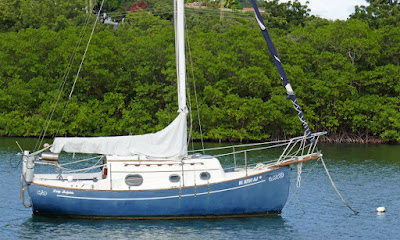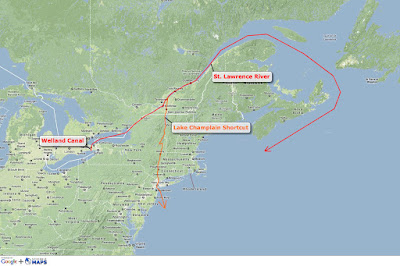Islomania
"Islands belong to the sea like the dark sands of my memories. When the morning comes they are stepping stones to the sun. And the mighty blue ocean keeps breaking on every shore. Like the spirit that binds us together, we are so much more than islands..."
-John Denver, lyrics from Island
It's a gripping disease, but not one you'll find shown on WebMD or even in the pages of most dictionaries. Islomania is an obsession and an extreme partiality for islands. But it's more than that. Islomaniacs crave isolation from something. Sometimes it's isolation from society, sometimes isolation from technology, and sometimes isolation from reality.
Were islomania better known, I'm sure those afflicted with it would be labelled as escapists, or some other -ist or -ism. What the labelers don't know is that escapists and islomaniacs are also running to something, not just from something. Some are running to dreams, some to beaches, and others to little latitudes, warm weather, and a simple life. As they run, the wind whooshes past their ears so they don't hear the naysayers, the bubble bursters, and bosses yelling something about reality and responsibilities.
Making landfall on an island always feels special. To me, islands that are only reachable by boat (as opposed to an airplane or bridge) feel the most magnetic. The ones out of reach to boats powered by consumables (gasoline, diesel) are even more so. These islands truly feel like they belong to the water and that we're merely visitors blessed with an opportunity to view a special way of life. These are the islands that make sailboats seem magical.
I first became aware of islomania when I read Thurston Clarke's Searching for Paradise: A Grand Tour of the World's Unspoiled Islands [Available from Amazon in the "Recommended Reading" section to the right of this text]. Clarke gives his perspective on the ailment by traveling to several remote islands and weaving a compelling read out of the cultural, historical, and natural traits of each. Ever since reading his book, I now think about the unique personality of each island I visit or spy on a nautical chart. Who first discovered it? Who lives there now? How was it formed? How has being surrounded by water changed the island? How has the very same water kept the island from changing at all? If you think you might have a touch of islomania, or if you're just interested in exploring the concept further, I urge you to check out Searching for Paradise.
An excerpt from Thurston Clarke's Searching for Paradise:
"In 1985, I spent a week on Christmas Island, a Central Pacific atoll belonging to Kiribati. The main island was 125 miles of scorching salt flats covered with palm, heliotrope, and rusting military equipment and surrounded by a boiling sea, a treacherous reef, and so many gray sharks no one went swimming without a billy club. The government officials posted from Tarawa had to be there; so did the copra cutters working on five-year contracts, and the incorrigible prisoners incarcerated in a jail that is the Devil's Island of Kiribati. But how to explain John Bryden? He was a large, good-natured Scotsman with a sun-scorched complexion who lived with his wife and children in a cinder-block house and earned a living repairing trucks and hauling cargo. He had come from Britain to work as an agricultural officer on Fanning, a nearby island, and after his contract expired he moved to Christmas Island instead of returning home. As we sat drinking beer one afternoon, staring at the yellowing frond of some drought-plagued palm trees, he said, "It's not a pretty island, is it? And as you've found, there's nowhere to swim. I tried jogging but it's too bloody hot. But I've been here five years, so I guess it isn't all bad."
The sun fell, the mosquitoes attacked, and the room darkened until we were silhouettes. I asked him why he stayed. He gave a deep sigh. The year before, four British technical advisers posted briefly to Christmas Island had become such bitter enemies they refused to speak and ate at separate tables in the hotel. They reminded him how much he loathed confrontations, feuding, and any kind of unpleasantness, and he supposed that was why he like friendly islands like this one."
Want to read all of Searching for Paradise? Get it here:
 |
| Garden Island (left) and Hog Island (right) breaking the horizon in northern Lake Michigan (photo by K. Walters) |
Were islomania better known, I'm sure those afflicted with it would be labelled as escapists, or some other -ist or -ism. What the labelers don't know is that escapists and islomaniacs are also running to something, not just from something. Some are running to dreams, some to beaches, and others to little latitudes, warm weather, and a simple life. As they run, the wind whooshes past their ears so they don't hear the naysayers, the bubble bursters, and bosses yelling something about reality and responsibilities.
Making landfall on an island always feels special. To me, islands that are only reachable by boat (as opposed to an airplane or bridge) feel the most magnetic. The ones out of reach to boats powered by consumables (gasoline, diesel) are even more so. These islands truly feel like they belong to the water and that we're merely visitors blessed with an opportunity to view a special way of life. These are the islands that make sailboats seem magical.
 |
| St. Kitts and Nevis rising with the sun in the Caribbean (photo by K. Walters) |
I first became aware of islomania when I read Thurston Clarke's Searching for Paradise: A Grand Tour of the World's Unspoiled Islands [Available from Amazon in the "Recommended Reading" section to the right of this text]. Clarke gives his perspective on the ailment by traveling to several remote islands and weaving a compelling read out of the cultural, historical, and natural traits of each. Ever since reading his book, I now think about the unique personality of each island I visit or spy on a nautical chart. Who first discovered it? Who lives there now? How was it formed? How has being surrounded by water changed the island? How has the very same water kept the island from changing at all? If you think you might have a touch of islomania, or if you're just interested in exploring the concept further, I urge you to check out Searching for Paradise.
 |
| Islands aplenty as viewed from South Benjamin Island in Lake Huron's North Channel (photo by K. Walters) |
An excerpt from Thurston Clarke's Searching for Paradise:
"In 1985, I spent a week on Christmas Island, a Central Pacific atoll belonging to Kiribati. The main island was 125 miles of scorching salt flats covered with palm, heliotrope, and rusting military equipment and surrounded by a boiling sea, a treacherous reef, and so many gray sharks no one went swimming without a billy club. The government officials posted from Tarawa had to be there; so did the copra cutters working on five-year contracts, and the incorrigible prisoners incarcerated in a jail that is the Devil's Island of Kiribati. But how to explain John Bryden? He was a large, good-natured Scotsman with a sun-scorched complexion who lived with his wife and children in a cinder-block house and earned a living repairing trucks and hauling cargo. He had come from Britain to work as an agricultural officer on Fanning, a nearby island, and after his contract expired he moved to Christmas Island instead of returning home. As we sat drinking beer one afternoon, staring at the yellowing frond of some drought-plagued palm trees, he said, "It's not a pretty island, is it? And as you've found, there's nowhere to swim. I tried jogging but it's too bloody hot. But I've been here five years, so I guess it isn't all bad."
The sun fell, the mosquitoes attacked, and the room darkened until we were silhouettes. I asked him why he stayed. He gave a deep sigh. The year before, four British technical advisers posted briefly to Christmas Island had become such bitter enemies they refused to speak and ate at separate tables in the hotel. They reminded him how much he loathed confrontations, feuding, and any kind of unpleasantness, and he supposed that was why he like friendly islands like this one."
Want to read all of Searching for Paradise? Get it here:




Comments
Post a Comment